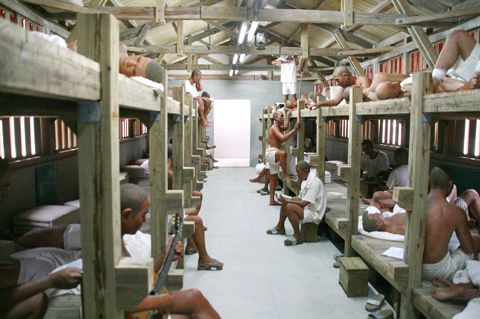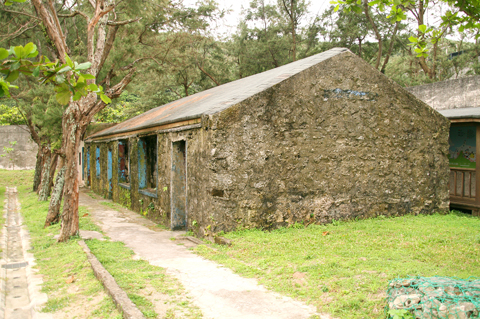Communist or Taiwan independence advocate; ethnic Taiwanese native or Mainlander.
It didn't matter. If the authoritarian government of dictator Chiang Kai-shek (蔣介石) believed you were a dissident, you could be locked up for decades or even executed.
“We're good buddies, we're brothers,” 84-year-old Huang Kuang-hai (黃廣海) said, putting his arm around 85-year-old Kue Chin-sun (郭振純), both of them smiling.

PHOTO: LOA IOK-SIN, TAIPEI TIMES
The two men — along with dozens of other former political prisoners incarcerated on Green Island — returned to the island recently, decades after their release to attend the inauguration of a reconstructed New Life Correction Center (新生訓導處).
Taiwan was officially under martial law from 1949 until 1987. From the 1950s thousands of political prisoners were kept first at the New Life Correction Center and then Oasis Village (綠洲山莊).
While it may seem perfectly normal for two former political prisoners to call each other friends, the relationship is more surprising when one learns about their backgrounds.

PHOTO: LOA IOK-SIN, TAIPEI TIMES
Huang was born in Guangzhou, China, in 1926, and came to Taiwan in 1950 as a soldier when the Chinese Nationalist Party (KMT) retreated after losing the civil war against the Chinese Communist Party (CCP). Although he was with KMT troops, Huang had always been fond of communism and to this date, the unification of Taiwan and China is still his biggest dream.
On the other hand, Kue is an ethnic Taiwanese born in 1925 and a diehard advocate of Taiwan independence.
“We're good buddies because we were both jailed for more than 20 years and for the most part, we were jailed together ... Of course we have different political views, but political views didn't really play a role when we lived together, worked together and helped each other out as political prisoners,” Huang said.
“We knew we disagreed with each other on ideology, so we never talked too much about it,” he added.
Although Huang was a CCP sympathizer, he never actually participated in any organization or political activities related to the party.
“I was sentenced to life in prison for complaining about Chiang Kai-shek in letters to friends in Hong Kong ... In those letters, I complained that Chiang was a dictator and the KMT regime was an authoritarian one,” he said.
“I was in the military at the time and they always checked what we wrote in letters — especially if the letters were going abroad — so they decided to charge me with 'repeatedly spreading false rumors' and sentenced me to life in prison,” he said.
Huang was sent to prison in 1954 and did not get out until 1975 when an amnesty was declared after Chiang passed away on April 5 that year.
During those 21 years, he was incarcerated in six prisons — two different Taiwan Garrison Command detention centers in Taipei City; the Ankeng Military Prison (安坑軍人監獄) in Sindian City (新店), Taipei County; the New Life Correction Center and the Oasis Village on Green Island; and Taiyuan Prison (泰源監獄) in Donghe Township (東河), Taitung County.
It was at Taiyuan and on Green Island that Huang met Kue.
Although Kue, was one of the many young Taiwanese who took up arms to fight the KMT following the 228 Incident in 1947, he escaped the mass arrests and executions that followed. He was less fortunate during the Martial Law Era.
In 1951, Kue campaigned for non-KMT candidate Yeh Ting-kuei (葉廷珪) in his victorious bid for Tainan City mayor. After the election, someone reported to the secret service that Yeh was connected to Thomas Liao (廖文毅), a Taiwan independence movement leader who formed the Provisional Government of the Republic of Formosa in Japan.
Kue said he was a supporter of Taiwan independence, but did not play a role in any advocacy organizations.
“They tortured me, trying to get me to admit to things I did not do, but I refused, so they could only sentence me to life in prison under the charge of 'repeated participation in unlawful assemblies' ... If I gave in, I could've been sentenced to death right away,” he said.
Kue said that when he was first arrested in Tainan, the secret service agents tore the nails off both his thumbs and his toes. He then was put into a big linen bag and dumped into a river for a few seconds.
“The worst thing was when they spilled sugar water all over me, and threw me into a courtyard — ants quickly found their way to the sweet taste, and bit me all over ... My hands had been tied behind me, so I could do nothing but roll on the ground,” Kue said.
Huang and Kue were sent to the New Life Correction Center in the 1950s and transferred to Taiyuan Prison in the 1960s. However, the two, along with all other political prisoners, were sent back to the newly constructed Oasis Village in the 1970s after several pro-independence prisoners, including Kue, organized a failed uprising.
Kue was also released when an amnesty was declared after Chiang's death.
Secret reports and torture were probably key reasons behind that high percentage of political prisoners who were falsely charged.
“During the initial years of the Martial Law Era, you could receive part of a dissident's property if you reported on the person and the person was ‘proven’ guilty,” said Tsao Chin-jung (曹欽榮), an independent researcher of political cases during the Martial Law Era.
“If the accuser wanted the money and the secret service agents needed names to meet their quota, then they tortured the victims into admitting whatever they wanted them to,” Tsao said.
While political prisoners were from all walks of life, another researcher who specializes in mainlander political prisoners, Huang Luo-fei (黃洛斐), said that Mainlanders were more likely to be reported as communists.
“Most Mainlanders in Taiwan had families and friends in China and they would miss their hometowns and their loved ones ... Well, a letter sent back home, a complaint about the KMT or saying that he or she wanted to go home could often be cited as evidence of a ‘connection to the communist bandits,’” Huang said.
According to an estimate from the Compensation Foundation for Victims of Improper Verdicts in the Martial Law Era (財團法人戒嚴時期不當叛亂暨匪諜審判案件補償基金會), more than 90 percent of political prisoners during the Martial Law period were unaware of the accusations made against them.
To date, the foundation has identified about 9,000 political victims from that time.
“But the real number is much higher because many government agencies in charge of handling political prisoners are still either unwilling to publicize lists or have already destroyed them,” a foundation board member, Chiu Rong-jeo (邱榮舉), told the Taipei Times.
“The Martial Law Era has a legacy that still impacts our society today ... For example, the culture of reporting on someone and the mentality of being overly careful in all things to avoid getting into trouble — especially in the government system,” Tsao said.
Issues that still need to be addressed are the unwillingness of public servants and officials who collaborated with the authoritarian regime to publicize all the official records of that period and the continued glorification of Chiang Kai-shek, Tsao said.

The High Prosecutors’ Office yesterday withdrew an appeal against the acquittal of a former bank manager 22 years after his death, marking Taiwan’s first instance of prosecutors rendering posthumous justice to a wrongfully convicted defendant. Chu Ching-en (諸慶恩) — formerly a manager at the Taipei branch of BNP Paribas — was in 1999 accused by Weng Mao-chung (翁茂鍾), then-president of Chia Her Industrial Co, of forging a request for a fixed deposit of US$10 million by I-Hwa Industrial Co, a subsidiary of Chia Her, which was used as collateral. Chu was ruled not guilty in the first trial, but was found guilty

DEADLOCK: As the commission is unable to forum a quorum to review license renewal applications, the channel operators are not at fault and can air past their license date The National Communications Commission (NCC) yesterday said that the Public Television Service (PTS) and 36 other television and radio broadcasters could continue airing, despite the commission’s inability to meet a quorum to review their license renewal applications. The licenses of PTS and the other channels are set to expire between this month and June. The National Communications Commission Organization Act (國家通訊傳播委員會組織法) stipulates that the commission must meet the mandated quorum of four to hold a valid meeting. The seven-member commission currently has only three commissioners. “We have informed the channel operators of the progress we have made in reviewing their license renewal applications, and

‘DENIAL DEFENSE’: The US would increase its military presence with uncrewed ships, and submarines, while boosting defense in the Indo-Pacific, a Pete Hegseth memo said The US is reorienting its military strategy to focus primarily on deterring a potential Chinese invasion of Taiwan, a memo signed by US Secretary of Defense Pete Hegseth showed. The memo also called on Taiwan to increase its defense spending. The document, known as the “Interim National Defense Strategic Guidance,” was distributed this month and detailed the national defense plans of US President Donald Trump’s administration, an article in the Washington Post said on Saturday. It outlines how the US can prepare for a potential war with China and defend itself from threats in the “near abroad,” including Greenland and the Panama

Taiwan People’s Party (TPP) Chairman Huang Kuo-chang (黃國昌) yesterday appealed to the authorities to release former Taipei mayor Ko Wen-je (柯文哲) from pretrial detention amid conflicting reports about his health. The TPP at a news conference on Thursday said that Ko should be released to a hospital for treatment, adding that he has blood in his urine and had spells of pain and nausea followed by vomiting over the past three months. Hsieh Yen-yau (謝炎堯), a retired professor of internal medicine and Ko’s former teacher, said that Ko’s symptoms aligned with gallstones, kidney inflammation and potentially dangerous heart conditions. Ko, charged with